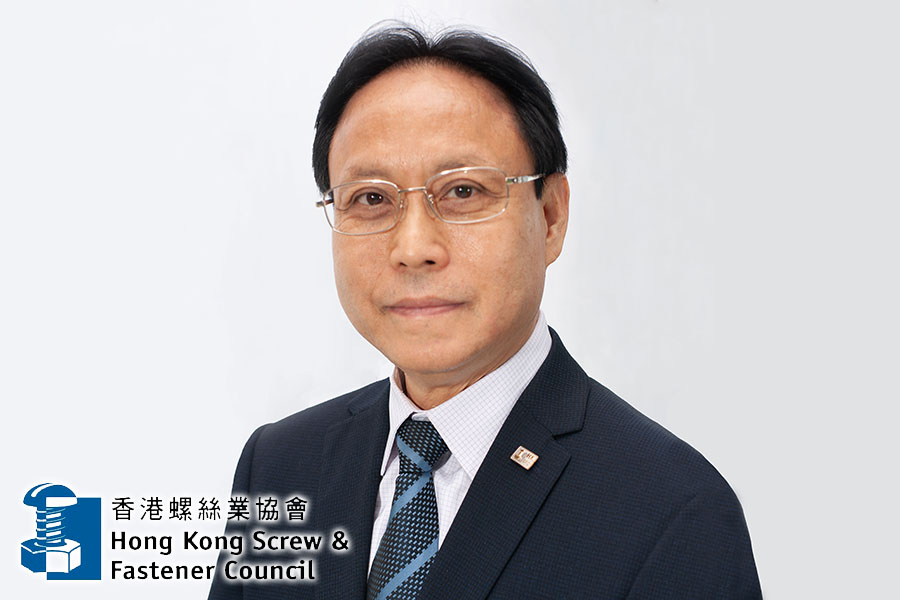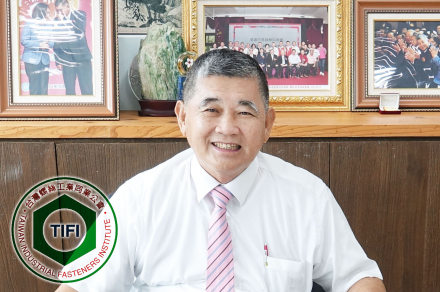GOVERNMENTS/ASSOCIATIONS/FASTENER GROUPS
Interview with HKSFC Chairman Tsui Ping Fai


Add to my favorite
2023-11-21
First of all, can you share with us the import and export performance of the fastener industry in Hong Kong in the past 2-3 years?
A: According to the data of the Hong Kong Trade Development Council (HKTDC), the overall export started to be very weak in 2022 and is still declining, and fasteners, which are the basic parts of the industry, are also seriously affected.
The import and export trade, one of the major driving forces of the Hong Kong economy, has continued to retrogress. The figures for this May show that both imports and exports fell worse than expected, resulting in the cumulative value of exports falling by 16.3% year-on-year in the first 5 months this year, while the cumulative value of imports dropped by 13.4%, and the trade deficit increased to HK$175 billion (about 20.4 billion euros).
HK Financial Secretary Paul Chan stated clearly that Hong Kong economy has so far been supported mainly by consumption, and he dares not say outright that the upper limit of the economic growth forecast of 3.5% to 5.5% can be maintained. Economist Wai-Kee Yuen is also pessimistic about the outlook of import and export trade, saying that it is already very good that import and export will not drag down economic growth for the whole year.
Compared with China, the export quantity of China's fasteners in January-June 2023 was 2,374,964 tons, down 96,603 tons or 3.6% year-on-year compared with the same period in 2022; and the export value was US$5,891.164 million, down US$4,832.31 million or 6.9% year-on-year compared with the same period in 2022.
Over the past few decades, many Hong Kong fastener suppliers have shifted their production to Guangdong or mainland neighboring cities because of their proximity. What advantages does this create for the fastener industry in Hong Kong?
A: The advantages of relocating Hong Kong's fastener manufacturing to the Mainland China are as below:
a. Low-cost labor: The relatively low cost of labor in Mainland China can save manufacturing costs.
b. Abundant supply of raw materials: Mainland China has a wide range of raw material suppliers.
c. Superior manufacturing infrastructure: Mainland China has modernized production facilities and infrastructure.
d. Market potential: Mainland China has a large market that offers potential customers and business opportunities.
e. Export Convenience: China has well-established Customs clearance procedures and transportation links, which are conducive to the export of products to int’l markets.
f. Geographic location: Hong Kong's proximity to Mainland China facilitates product transportation and logistics.
g. Government support: The Chinese government provides various policy support and incentives to encourage foreign-invested enterprises to set up production bases in China.
h. Technology and Talent: China has a wide range of technical and engineering talent that can provide assistance and expertise.
What kind of fasteners do most of your member companies produce? What are the main applications? What is the approx. ratio of their domestic and export sales? What specific contribution can these Hong Kong companies having sufficient experience in import/export, production and sales make to the global fastener supply chain?
A: Generally, they produce precision fasteners, including screws, nuts, bolts, screw bolts, threaded rods, screw rings, screw caps, screw sleeves, threaded inserts, screw knobs, mainly used in automobile manufacturing, aerospace, high safety requirements of toys and electronics industry, medical equipment, power industry, building and construction, mechanical engineering, transportation and related equipment. With the economic development of Mainland China, the current domestic demand has increased significantly compared to the previous reliance on foreign sales (domestic sales: 40% / foreign sales: 60%). Contributions to the global fastener supply chain from Hong Kong fastener manufacturers investing in China include:
· Production bases: Hong Kong fastener manufacturers have established production bases in Mainland China to improve production efficiency and reduce production costs, thus adding capacity to the global fastener supply chain.
· Quality control: fastener manufacturers investing in Mainland China often have modern production facilities and quality control systems in place, helping provide high quality products and raise quality standards in the global supply chain.
· Market expansion: the Chinese market is huge, and investments by Hong Kong fastener manufacturers can help expand their market share, while also providing broader opportunities for the global fastener industry.
· Supply chain diversity: investment in fastener manufacturers in Mainland China increases the diversity of the global fastener supply chain and reduces the dependence of the global supply chain on a particular region or country.
· Innovation and technology: Hong Kong companies investing in Mainland China not only help with production, but also with technological innovation and R&D, thus providing more advanced fastener solutions globally. All in all, Hong Kong fastener industry's investment in Mainland China contributes more supply capacity, diversity, quality standards and market opportunities to the global fastener supply chain, thus strengthening the competitiveness of the global fastener industry.
· Int’l Trade Hub: Hong Kong is strategically located in Asia, making it a hub for int’l trade. Hong Kong's well-developed freight and logistics infrastructure effectively connects fastener manufacturers and consumer markets around the world.
· Int’l exhibitions and exchanges: Hong Kong regularly organizes int’l exhibitions and exchanges related to fasteners, providing opportunities for industry players to showcase their products, establish partnerships and learn about industry trends.
Regarding the EU’s CBAM measures in a pilot phase since Oct. 01, has the fastener industry in Hong Kong responded to the measures in various aspects? Has HKSFC provided some assistance and counseling to its members?
A: For the fastener manufacturing industry, responding to CBAM may involve the following steps:
Determining carbon emissions: first, fastener manufacturers need to assess the carbon emissions of their processes, including production, transportation and raw material sourcing.
Adoption of measures to reduce emission: based on results of carbon assessments, fastener manufacturers can adopt measures to reduce carbon emissions, such as improving production processes, using more environmentally friendly raw materials, or improving logistics and supply chains.
Compliance with regulations: to ensure that your business complies with CBAM's regulations, including reporting carbon emissions data and complying with related regulations.
Preparing to pay carbon tariffs: if the imported product does not have a similar carbon reduction policy in the country of manufacture, the company may need to prepare to pay carbon tariffs to ensure fair competition.
Hong Kong government support: businesses can work with the government, HKPC and others for support, guidance and resources to meet CBAM requirements.
Hong Kong Screw & Fastener Council holds regular meetings to share the latest news on CBAM carbon emissions, organizes study tours, and works closely with government agencies such as the Hong Kong Productivity Council (HKPC), where government consultants provide us with professional advice on CBAM.
Apart from the voluntary carbon footprint verification conducted by the industry and the subsequent introduction of carbon reduction and improvement programs, does the Hong Kong government also provide guidance and support to the industry in terms of policy in relation to CBAM?
A: (a) HKPC provides a full range of carbon management services such as carbon footprint, auditing and consulting; (b) Green Hong Kong - Carbon Audit; (c) Council for Carbon Neutrality and Sustainable Development; (d) Carbon Neutrality Partnership; (e) Green Tech Fund.
HK Government set up a Green Tech Fund (GTF) in 2020 to support research projects that could contribute to carbon reduction and environmental protection in Hong Kong. Local public research institutes, research centers and private companies engaged in these projects can now receive more adequate and targeted funding. HK Government has injected HK$400 million into the Fund. The amount of funding provided under GTF ranges from HK$2.5 million to HK$30 million per project.
The Chinese government: the completion of the "double carbon" goal is inseparable from the financial and tax policy support. It also gave four major requirements, including all levels of finance divisions to increase support for the development of green and low-carbon industries, technology R&D, etc.; to improve the government's green procurement standards, and increase the purchase of green and low-carbon products; the implementation of environmental protection, energy and water conservation, and preferential taxes for new energy and clean energy vehicles and boats; studying tax policies related to carbon emission reduction, etc. In addition, the Ministry of Finance is taking the lead in drafting the “Guiding Opinions on Financial Support for Carbon Peak Achievement and Carbon Neutrality.”
Facing a global fastener market surrounded by powerful competitors, is there any way for Hong Kong fastener industry to enhance its int’l competitiveness and uniqueness? What resources can HKSFC provide to help members increase their visibility in the market?
A: a. Invest in R&D and innovation: to meet market demands and provide better solutions through continuous R&D of new technologies and products.
b. Improve product quality: ensure that the quality of our products is at the highest level to meet customer expectations.
c. Customization: understand customers' needs and provide customized products to meet their requirements.
d. Environmental and social responsibility: more consumers are concerned about environmental and social responsibility issues. Adopt sustainable production methods and actively participate in social responsibility activities.
e. Brand building: invest in brand building and increase product awareness through effective marketing and brand promotion.
f. Int’l cooperation: cooperate with int’l partners to develop new markets and products.
HKSFC regularly organizes technical seminars, participates in government-subsidized cross-border delegations, and organizes delegations to visit internationally renowned exhibitions in order to enhance the visibility of members in the market and to promote int’l exchanges in fasteners and various types of automotive and medical manufacturing industries. We are committed to ensuring that our members are able to keep abreast of market conditions and share their experiences in technology, quality management, investment and operation in a cohesive and enjoyable manner.
What activities have been planned by HKSFC in 2024?
A: In 2024, we plan to organize the following activities: Four Region Fastener Associations Conference, participation in overseas exhibitions (e.g., Automechanika Frankfurt, Expo Nacional Ferretera, Fastener Expo Shanghai, etc.). We will also organize some industry learning and exchange missions to countries like Turkey, Vietnam, Japan, etc. We will also organize promotional meetings and sharing sessions for the industry and members to further exchange and interact with each other.
What are your expectations for the development of the fastener industry in Hong Kong in 2024?
A: Due to Hong Kong's unique historical background, along with the rapid development of China's economy in the past 2-3 decades, Hong Kong's fastener industry has been well supported in investing in the Mainland's industrial market and infrastructure, including supply chain and policy support. In recent years, the Chinese government's focus on Hong Kong and the Greater Bay Area has brought new and rich opportunities to Hong Kong. However, the trade wars and pandemic in the past few years have adversely affected China's exports and global economic demand. We look forward to an early end to conflicts around the world next year, the realization of world peace, and a decline in energy prices before the global economy recovers and the consumer power of countries increases, further boosting demand for manufacturing and industrial products, and an early recovery of our fastener market.
In addition, the Chinese government has recently fully liberalized the manufacturing sector for foreign investors by removing all restrictions on their access to the sector under the eight actions of the Belt and Road Initiative. This has had a positive and far-reaching impact on foreign investors setting up factories of various technologies in China. As long as more foreign-invested factories are established in China, the demand for industrial supply chain components such as plastics, electronics, and our fasteners and hardware parts will increase. This is the future we are looking forward to.
Thanks to the technological advancement of our investors and customers from various countries, it has had a good impact on China's industry, positively contributing to our raw material production, equipment, product technology and innovation, and even the optimization of our software and automation management systems. We look forward to Hong Kong and our industry counterparts working together, keeping pace with the times, exchanging ideas, and working together to meet new challenges and opportunities such as carbon neutrality. We wish you all the best for the coming year.
香港螺絲業協會
徐炳輝主席
扣件
CBAM
碳盤查
工業零部件
五金零件
HKSFC
Chairman Tsui Ping Fai
fastener
carbon footprint verification
industrial component
hardware
扣件
國際展會
惠達雜誌
匯達實業
外銷媒合
廣告刊登
螺絲五金
五金工具
紧固件
台灣扣件展
印度新德里螺絲展
越南河內螺絲展
墨西哥瓜達拉哈拉螺絲展
美國拉斯維加斯螺絲暨機械設備展
波蘭克拉科夫螺絲展
義大利米蘭螺絲展
德國司徒加特螺絲展
wire Dusseldorf
FASTENER FAIR INDIA
FASTENER FAIR VIETNAM
FASTENER FAIR MEXICO
FASTENER POLAND
FASTENER FAIR ITALY
FASTENER FAIR GLOBAL
FASTENER WORLD
READ NEXT

Subscribe







